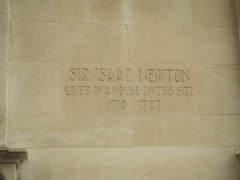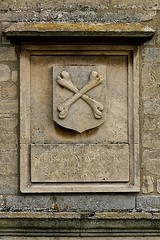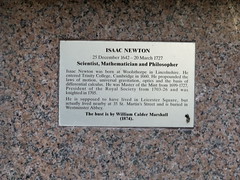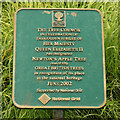Sir Isaac Newton PRS


Sir Isaac Newton PRS
(1642-1727)
scientist, mathematician, philosopher, 12th President of the Royal Society (1703-1727), and Knight Bachelor (from 1705)
friend of Arthur Storer
Commemorated on 11 plaques
Sir Isaac Newton 1642-1727 lived here
87 Jermyn Street, Westminster, SW1, London, United Kingdom where they lived
Sir Isaac Newton Lived in a house on this site 1710-1727
Whitcomb Street, London, United Kingdom where they lived
In this manor house Sir Isaac Newton Knt was born 25 December A.D. 1642
Woolsthorpe Manor, Woolsthorpe by Colsterworth, United Kingdom where they was born (1642)
Isaac Newton, 25 December 1642 - 20 March 1727, Scientist, Mathematician, Philosopher. Isaac Newton was born at Woolsthorpe in Lincolnshire. He entered Trinity College, Cambridge in 1660. He propounded the laws of motion, universal gravitation, optics and the basis of differential calculus. He was Master of the Mint from 1699 - 1727, President of the Royal Society from 1703 - 26 and was knighted in 1705. He is supposed to have lived in Leicester Square, but actually lived nearby at 35 St. Martin's Street, and is buried in Westminster Abbey. The bust is by William Calder Marshall (1874).
Newton bust, Leicester Square, London, United Kingdom where they is commemorated
In this hall of The King's School Isaac Newton was taught 1654 - 1660 This plaque was set up to mark the tercentenary visit of The Royal Society 1960
The King's School, Church Street, Grantham, United Kingdom where they was taught (1653-1659)
Sir Isaac Newton 1642 - 1727 site of a house owned by Mr. Clark the apothecary. Isaac Newton lodged here whilst attending the Grammar School, Grantham, between 1655 and 1660. Universally regarded as one of the world's greatest scientists.
14 The George Shopping Centre, Grantham, United Kingdom where they lodged (1654-1659)
The Tree Council in Celebration of the Golden Jubilee of Her Majesty Queen Elizabeth II has designated Newton's Apple Tree one of fifty Great British Trees in recognition of it's place in the national heritage June 2002 Supported by the National Grid
Woolsthorpe Manor, Woolsthorpe by Colsterworth, United Kingdom where they was
Orange Street Congregational Church This church was founded in 1693 by Huguenot refugees who fled from France at the time of the Revocation of the Edict of Nantes. In 1776 the Chapel passed into the hands of the Church of England. The Rev. Augustus III. Toplady author of "Rock of Ages" was one of its ministers. The Chapel passed into the hands of the Congregationalists in 1787. Adjoining the chapel was Sir Isaac Newtons house which was built in 1710 and condemned in 1913. Mrs Jemima Luke, author of the beloved hymn "I think when we read that sweet story of old" was a teacher in the Sunday School. A copy of the hymn in her own handwriting is in possession of the church.
Orange Street, London, United Kingdom where they was
In the hall of this school Sir Isaac Newton was taught
Church Street, Grantham, United Kingdom where they was taught
Arthur Storer 1645-1687 astronomer & mathematician attended this school with his lifelong friend Sir Isaac Newton. First named astronomer in North America. Mentioned in Newton's Principia
King's School, Church Street, Grantham, United Kingdom where they attended school
Rev Dr William Stukeley 1687-1765 pioneer antiquarian lived in a house near this site 1726-1730 accurately recorded Stonehenge and Avebury prehistoric monuments, wrote memoirs of Sir Isaac Newton
72 Castlegate, Grantham, United Kingdom where they was











